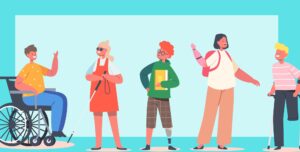Ferris decided to put on a few events last week to show awareness for visible and invisible disabilities.
The biggest barrier people with disabilities encounter is other people. Disability awareness means educating people on disabilities and giving people the knowledge required to carry out a job or task, thus separating good practice from poor. It is no longer enough just to know that disability discrimination is unlawful.
On Tuesday, Ferris hosted a panel where students discussed their different disabilities and the high and low points they have encountered while attending school with their disabilities.
Digital animation and game design senior Valerie Guerra has Spina Bifida, a condition that affects her spine. She spoke about the discomfort she experiences when navigating the halls of the Starr building and the three other connected buildings.
“If you go into a building using one floor, the next building will be a different floor,” Guerra said. “It’s extremely hard and frustrating having to navigate buildings of this magnitude.”

During the panel, the students were able to talk about anything they wanted, whether it be explaining their disabilities or sharing their experiences.
Social work senior Autumn Wutz has been diagnosed with Postural Orthostatic Tachycardia Syndrome, which is a heart condition that constricts blood flow during physical activities. Wutz is currently going through the process of getting diagnosed with Multiple Sclerosis, which is a condition that causes the nerves in her body to deteriorate quickly. Wutz is also going through the diagnostic process of Ehlers Danlos Syndrome, which is a group of inherited disorders that affect your connective tissues, primarily your skin, joints and blood vessel walls.
“As an able-bodied looking student, some faculty look at me [differently] when I tell them that I am disabled, and some don’t seem to believe me,” Wurtz said. “[Once,] I took a [handicap spot] in the faculty lot…, and a faculty member told me I’m not allowed to park there… I simply said, ‘There is no other parking, and I am disabled. Have a good day.’”
Senior Nicole O’Brien was diagnosed with Cerebral Palsy, which is a group of disorders that affect a person’s ability to move and maintain balance and posture. O’Brien spoke about the time one of her teachers helped her.
“I was stressed with some of my work because not everything is accessible for me, and he sat down and talked to me and told me he would give me extensions on anything I needed because he knows these programs aren’t easy for me to navigate,” O’Brien said.
The panel was informative because it gave students without disabilites the chance to step into the shoes of those who do. Between the good, the bad and the ugly, this panel helped a lot of people understand different disabilities a little more.
On Thursday, the Office of Accessibility and Disability Services hosted a disability resource fair where five different organizations shared different disability resources that people can use.
Director of Accessibility and Disability services Julie Alexander spoke about why they hosted this fair.
“This is the second annual resource fair that we have been able to put on [as] a part of Disability Awareness Month,” Alexander said. “Disabilities are something we don’t like to talk about in society, and people with visible or invisible disabilities might not know who can help, so we wanted to bring them this fair to show what’s out there.”
Michigan Rehabilitation Services is a service that shows the importance of including those with disabilities. MRS helps individuals with disabilities acquire jobs and keep them. If the job isn’t a perfect match, MRS will look at why it might not be and see if they can help with accommodations to make it work out. Hearing-Life works with MRS to help students who need hearing aids.
Action Track-Chair USA is a business that creates wheelchairs for people who want to take their lives back from their chair. Roughly 6,000 chairs are made everyday. These chairs are able to go through grass and different types of land. The chairs come in different models, including a sit down model and a stand up model, which helps with health benefits in the long run.
Area 5 Special Olympics is the world’s largest sports organization for children and adults with intellectual and physical disabilities. They provide year-round training and activities to five million participants and unified sports partners in 172 countries. Area 5 Special Olympics currently has 96 athletes, and they are looking to expand further in the coming years.
OrCam is a device that can scan and read things off for you. It is a new technology that reads tech, facial recognition, product identification, money notes and AI tech. You don’t need WiFi to use this device.
Deaf and hard of hearing services serve 27 counties in West Michigan. They focus on advocating for those who are hard of hearing through youth programs, community education and hearing and communication technologies.
Ferris did a great job providing information on the different disabilities and resources throughout this week.
